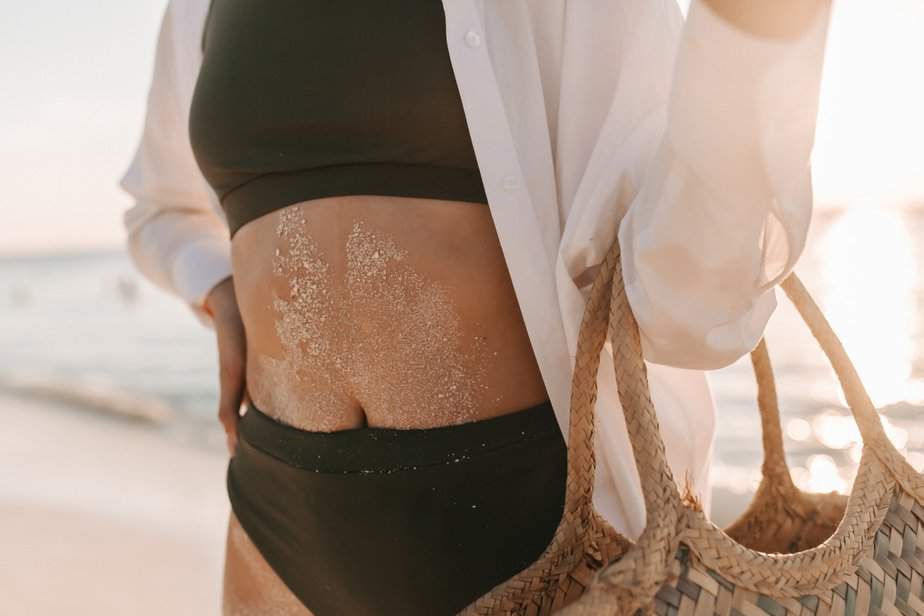Bathing suit cover ups are essential beachwear that you need to have if you plan on spending a lot of time at the beach. Their primary purpose is to cover up your swimwear so that you can look modest without needing to change out of your bathing suit. This is a blessing because sometimes you just need to quickly pop into a store but you can’t do that in just your swimsuit.
Another benefit of swimsuit cover ups is how airy they are. This is to ensure that your swimsuit underneath will dry quickly, but the fast-drying capabilities has got people thinking: can you just wear the swimsuit cover up into the water? The rationale seems to be that since it dries quickly, then it can also be worn into the water. Some people also cite religious reasons, as well as the desire to not show much skin in the water, and extra UV protection.
Technically, you are allowed to wear a cover up into the water (but not in public pools where there are strict dress codes). However, doing so would introduce more downsides than upside, including a higher risk of drowning. Furthermore, the upsides like more modesty or UV protection can be had by wearing a more modest swimsuit such as a dive skin or burkini. There is no good reason to wear a swimsuit cover up in the water as it can only harm you.
In this article you will learn why swimsuit cover ups are not a good idea to wear into the water despite some of the upsides it might have. You will also learn about some better alternatives to be worn while swimming than swimsuit cover ups.
Why are people wearing cover ups in the water?
UV protection
Are you tired of going through bottle after bottle of sunscreen, only to end up getting sunburned anyways because you couldn’t apply the sunscreen evenly? It’s much easier to wear clothing that has a high ultraviolet protection factor (UPF) so that you don’t need to apply sunscreen under covered areas.
Naturally, any beachwear, cover ups included, have a high UPF of 50. This means that out of 50 UV rays, only one UV ray will penetrate through the cover up and reach your skin, which is a 98% block rate.
Wearing a cover up for UV protection is a great idea… on land. In the water, not so much. Please refer to the previous section for examples of alternative swimsuits that provide ample skin coverage. Those swimsuits also have a UPF and are designed to be worn in the water, unlike a cover up.
Modesty/Religious reasons

There is often considerable overlap between religious people not wanting to break any rules of their religion and those who want to cover themselves up more at the beach, so both points will be addressed here.
Whether you’re religious or not, there is nothing wrong with wanting to cover up more of your body at the beach. With how revealing swimsuits are nowadays, even some of the more progressive people are wondering if we’ve gone too far in the skimpiness department. That’s a topic for another day; if you’re feeling uncomfortable, there are better ways to cover yourself up.
First off, you have more options than simply wearing a bikini or the conventional one piece swimsuit that looks like a sleeveless leotard. Whether it’s a one piece or two piece swimsuit, there are styles that provide ample coverage.
For one piece swimsuits, you can wear a full body dive skin, a swim dress, a burkini, or you can wear swim shorts over the one piece swimsuit. You can also get a one piece swimsuit that has arm sleeves and leg sleeves.
For two piece swimsuits, you can wear a tankini, high-waisted bikini bottoms, or swim shorts with a tankini top, or any number of frilly designs that use more fabric. As you can see, there are many styles of swimsuits that provide more coverage that are actually designed to be worn in the water unlike a swimsuit cover up.
Lack of confidence
Swimsuits are revealing. Even ones that cover up your body entirely can be revealing because of how skin tight it is. Your figure will still be easily seen, and if you have body image issues, then this can feel very invasive. That said, while a cover up seems to solve this problem, it’s not the optimal solution.
First off, you can get swimsuits that cover more of your body. Even if your figure can be seen, at the very least it can hide any scars, rashes, tattoos, stretch marks, or any other superficial imperfections.
If you even want your figure to be obscured, there are swimsuits that can do that too. You should look for swimsuits with ruching, which is when there is loose fabric that creates an alluring ripple-like effect.
You can also further obscure your figure by choosing select patterns or colors. For instance, darker colors are less likely to become see-through and they hide stains well. Swimsuit designs that have a vertical pattern or smaller prints can make you look slimmer. The patterns themselves can also make it harder to see your private parts.
Once again, wearing a swimsuit that provides more coverage is simply the superior option than wearing a cover up in the water.
Disadvantages of wearing a swimsuit cover up in the water
In addition to swimsuit cover ups being outclassed in the areas where it provides benefits, cover ups also introduce many downsides that make them a terrible choice to wear in the water.
They make it harder to swim and stay afloat
This is the big problem, and it’s this issue alone that makes cover ups in the water a deal breaker. For starters, any loose clothing becomes a hazard in the water.
When clothing soaks up water, it will become much heavier and restrictive. Swimsuits are specifically made from materials that minimize absorption and they are also very form fitting. While a cover up is better than regular clothes, with all the extra fabric floating around, you will find your movements restricted and this poses a serious hazard when waves come into the equation.
Even at a public pool, cover ups are not allowed due to the safety risk they pose on the wearer. How much worse is it in the ocean?
They will get worn down quickly
Regardless if it’s worn in the ocean or the pool, the high concentrations of salt or chlorine in the water will quickly wear down a bathing suit cover up.
Yes, a cover up can be worn over a wet swimsuit which exposes it to chlorine or saltwater. However, the exposure is significantly less than wearing the entire cover up into the water.
If you do not quickly rinse off the salt or chlorine from the cover up, expect the fibers to become weakened over time until the cover up simply deteriorates.
Are there any swimsuit covers you can wear in the water?
You should wear the appropriate clothing for the situation. If you want to actually go into the water but fear that you look too immodest or that you will get sunburned then wear a swimsuit that provides more skin coverage.
Do not try to use a bathing suit cover up, which is intended to be worn on land, to achieve the same result. You are putting yourself at a higher risk of drowning and you will be ruining your nice cover up in one fell swoop.
While you can technically wear whatever you want in the water, anybody with any sense of self-preservation should know that it’s incredibly dangerous and feels uncomfortable. As such, there are no swimsuit covers we can recommend wearing in the water because that’s not where they should be worn.


